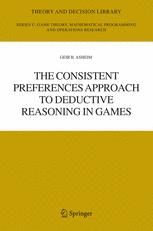

Most ebook files are in PDF format, so you can easily read them using various software such as Foxit Reader or directly on the Google Chrome browser.
Some ebook files are released by publishers in other formats such as .awz, .mobi, .epub, .fb2, etc. You may need to install specific software to read these formats on mobile/PC, such as Calibre.
Please read the tutorial at this link: https://ebookbell.com/faq
We offer FREE conversion to the popular formats you request; however, this may take some time. Therefore, right after payment, please email us, and we will try to provide the service as quickly as possible.
For some exceptional file formats or broken links (if any), please refrain from opening any disputes. Instead, email us first, and we will try to assist within a maximum of 6 hours.
EbookBell Team

4.8
44 reviewsDuring the last decade I have explored the consequences of what I have chosen to call the 'consistent preferences' approach to deductive reasoning in games. To a great extent this work has been done in coop eration with my co-authors Martin Dufwenberg, Andres Perea, and Ylva Sovik, and it has lead to a series of journal articles. This book presents the results of this research program. Since the present format permits a more extensive motivation for and presentation of the analysis, it is my hope that the content will be of interest to a wider audience than the corresponding journal articles can reach. In addition to active researcher in the field, it is intended for graduate students and others that wish to study epistemic conditions for equilibrium and rationalizability concepts in game theory. Structure of the book This book consists of twelve chapters. The main interactions between the chapters are illustrated in Table 0.1. As Table 0.1 indicates, the chapters can be organized into four dif ferent parts. Chapters 1 and 2 motivate the subsequent analysis by introducing the 'consistent preferences' approach, and by presenting ex amples and concepts that are revisited throughout the book. Chapters 3 and 4 present the decision-theoretic framework and the belief operators that are used in later chapters. Chapters 5, 6, 10, and 11 analyze games in the strategic form, while the remaining chapters-Chapters 7, 8, 9, and 12-are concerned with games in the extensive form.